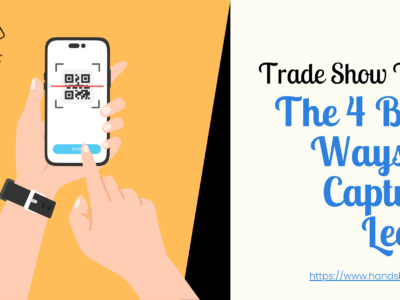While lead capture and lead retrieval apps serve a similar purpose of collecting lead information, there is a distinction between the two in terms of their functionality and usage. Here’s a breakdown of the key differences between lead capture and lead retrieval apps:
Lead Capture App:
A lead capture app is primarily designed to capture lead information in various contexts, such as online forms, landing pages, trade shows, events, or even in-person interactions. It focuses on the initial stage of lead generation, where businesses aim to collect contact details and other relevant information from potential customers or clients.
Key Features of a Lead Capture App:
- Data Collection: A lead capture app provides customizable forms or templates to capture lead information. It typically collects essential contact details such as names, email addresses, phone numbers, and company information. Although this is more flexible than a lead retrieval solution since it will work at any event, it is more prone to user errors.
- Multi-channel Capture: Lead capture apps allow businesses to capture leads through various channels, including websites, landing pages, social media, events, or offline interactions. This is one of the big advantages over lead retrieval apps.
- Real-time Data Capture: The app captures and stores lead information in real-time, ensuring that businesses can access and follow up with leads promptly. This is about the same as a lead retrieval app, although lead retrieval is usually less manual and saves a little time.
- Lead Scoring and Qualification: Some lead capture apps offer lead scoring and qualification features to prioritize and categorize leads based on predefined criteria.
- Automation and Integration: Lead capture apps may integrate with other sales and marketing tools, such as CRM systems or email marketing platforms, to automate lead nurturing and follow-up processes.
- Business Card Scanning: One form of a lead capture app is a business card scanner. Although there are not many apps that combine business card scanning with other forms of lead capture such as forms, surveys, and QR code scanning.
Lead Retrieval App:
A lead retrieval app, on the other hand, focuses specifically on capturing lead information at events, such as trade shows, conferences, or exhibitions. It is designed to streamline the lead capture process in a fast-paced event environment, where exhibitors can quickly and efficiently gather lead information from event attendees.
Key Features of a Lead Retrieval App:
- Badge or QR Code Scanning: Lead retrieval apps typically use barcode or QR code scanning capabilities to capture lead information from attendee badges.
- Real-time Lead Capture: Similar to lead capture apps, lead retrieval apps offer real-time lead capture, ensuring that lead information is available immediately within the app. The benefit of lead retrieval apps over lead capture apps is that the data is likely to be more accurate since it is pre-loaded by the event coordinator.
- Lead Qualification and Notes: Lead retrieval apps don’t often provide features for exhibitors to qualify leads. However, many do allow users to add notes or qualifiers to categorize and prioritize leads based on their interest or potential.
- Lack of Integration with CRM Systems: Most lead retrieval apps don’t integrate with CRM systems or lead management platforms since they are specific for an event.
- Limited Analytics and Reporting: Lead retrieval apps may provide limited analytics and reporting features to evaluate the success of event participation and track key metrics related to lead capture performance.
- Lack of Business Card Scanning: Most lead retrieval apps do not include a business card scanner because instead, they rely on the event attendee data to retrieve attendee information.
While lead capture apps are more versatile and cater to various lead generation contexts, lead retrieval apps are specifically tailored to streamline the lead capture process at events. Lead retrieval apps focus on quickly capturing lead information from event attendees using badge or QR code scanning technology, facilitating efficient lead capture and follow-up in a dynamic event environment.
Although more versatile, another difference is that trade show lead capture apps tend to be able to be used at various events or for multiple purposes. The downside is that they may not be as accurate due to user typos or because they pull information from various sources.
Where as lead retrieval apps for trade shows usually are provided by that particular event coordinator for an additional cost, and and contain better results of the event attendees. The downside is that they typically are expensive for what you get, can only be used for that event, don’t connect with your CRM, and don’t offer any added features to help you follow-up.
Learn more by reviewing our articles on trade show lead capture apps verses lead retrieval apps.


